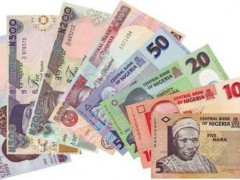Don’t tell us, we want to see it for ourselves: The quest for truly inclusive development

According to Trading Economies, “Nigeria’s GDP growth accelerated to 6.81 percent in the third quarter of 2013, up from 6.18 percent in the previous quarter.” Photo Credit – www.tradingeconomics.com
Talking about inclusive growth and sustainability from a Nigerian perspective, does economic growth and improvements in the daily lives of citizens go hand in hand?
To give a rounded answer, we need to define some key terms. If we try to merge the dictionary definitions of what these ‘inclusive’, ‘growth’, and ‘sustainability’ mean, we would get a statement like, “The ability for progressive development to be available to everyone continually without resources being totally depleted or destroyed.” Thanks Merriam Webster!
Situating such definitions in the Nigerian context and replacing abstract words with the realities on ground, that carefully crafted sentence would now read: the sustained availability of electricity, water, functioning transport infrastructure, affordable and accessible healthcare, and profitable employment for all – not just a fraction of society.
If we look at growth from this truly inclusive on-the-ground perspective, we have to ask ourselves such inevitable and obvious questions as:
- How do the trips to China and other such countries to ‘strengthen bilateral relations’ translate into a better standard of living for a family in the village?
- How does debt relief for the country bring any relief to my circumstances as an entrepreneur struggling to find an investor or secure a loan from a bank?
- How do funds received from donor agencies bandied about on television mean that as a farmer I will have better access to fertilizers, and the infrastructure that encourages profitability?
Subsidies on petroleum products were withdrawn abruptly in the country on the 1st of January 2012, raising the cost of fuel from 65 naira per litre to a end price of 97 naira, leading to #OccupyNigeria, the most publicised protests the country has seen since perhaps the 1929 Aba women’s riot.
The very next month, President Goodluck Jonathan inaugurated a committee, the foundation for a special intervention programme called SURE-P, Subsidy Reinvestment and Empowerment Programme to be be funded by the money saved by removal of the petrol subsidy. Talking about the ‘special interventions’, Dr Christopher Kolade the chairman of the fund (who has now resigned) said, “There is a document called the SURE-P programme which guides the projects we embark upon. Most of these projects are in categories; component A; Social safety, Component B; Niger-Delta Development project; Component C; road infrastructure projects; Component D; rail transport project, Component E; water and agricultural projects, Component F; selected power projects, Component G; Petroleum NNPC Projects, Component H; ICT projects…”
Such talk just makes you wonder what the local government chairmen, state and national constituency representatives, and state governors actually do with the allocations they receive every month. Even more bewildering are reports that 500 billion naira of this fund has gone ‘missing’. It now seems to have been shared amongst local governments but isn’t the confusion about the whereabouts of that huge sum of money really worrisome?
Or take the YouWin (Youth Enterprise With Innovation in Nigeria); another initiative by the Presidency to support entrepreneurs aged 18-35. The scheme seems to have been successful, as the tweets below indicate.
But, again the question here is, isn’t this a duplication of the function of the SURE-P and the original mandate/functions of elected public leaders? Or in other words, how come with this huge number of initiatives we are yet to see any significant reduction in the number of the unemployed?
Coordinating Minster of Finance and the Economy, Okonjo-Iweala said recently that Nigeria’s economy has grown every year by 5% in the last five year period. Obviously this sounds great, but how has it bettered the lives of Nigerians?
The rise and fall of the dollar and the rise and fall of crude oil has no effect on a young person who has been out of school for over five months because the Academic Staff Union of Universities (ASUU) downed tools in July this year. There are little or no opportunities for internships, he has no interest in learning a trade (or cannot access a skills acquisition centre), and so the prime of these young lives are wasted while the government and ASUU stay busy exchanging words on injecting money into universities.
Nigeria needs to work towards seamless harmonisation between all these ‘programmes’ because right now they all end up looking like avenues for further impoverishment of the already downtrodden. Perhaps at the end of the day all we really need is not the big grammar of macroeconomic jargon but simply renewed dedication by public officers in working for Nigeria in honesty and good faith, with less focus on where the next deal comes from or on securing the budget for two new armoured protocol limousins.



